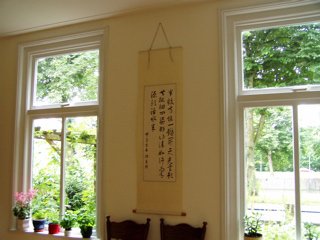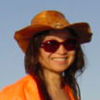Journal entries
Le Bon Journal
About
Search
Contact
Readers write
Show your support
Bon Journal
Zhu Xi poem: grandfather's calligraphy
My late grandfather practised yoga and walked long distances daily. Despite his concern for fitness, he smoked cigarettes like other male members of his generation. He also enjoyed writing Chinese calligraphy. Hanging on my wall between two large windows is a scroll he wrote several years before he died of lung cancer. My mother had given it to me to keep as a family heirloom. [Below: click to view larger picture.]
My grandfather probably chose this poem for a specific reason. I suspect one needs to go beneath the surface of what the neo-Confucian philosopher Zhu Xi wrote in this poem. I wrote to my scholarly father to ask about the poem, the title, the poet, and the meaning. He showered me with information.
The scroll contains no mention of title or poet's name, but my father was able to find it. He said it's a poem most 6th graders can find in their textbooks: a poem dating back nearly a thousand years.
My father translates as follows:
title: Feeling on reading a book
1. My half a mu square pond is like a mirror in an open box (in ancient time, the mirror comes in a box)
2. The sunlight and shadow of clouds linger in the mirror together;
3. I ask the pond how it gets the water so limpid (clear),
4. That is because running water is coming from the source.
Could it be about getting the truth from the source, whereas most of the time, we only get a reflection (mirror) or a snapshot version of it? Or that reading books is like being in clear water, seeing things clearly, but it's only a reflection of the sky and the clouds, above which we know nothing? Or perhaps, Zhu Xi wrote this when he was drunk. Maybe there is nothing deep in it? Who knows?
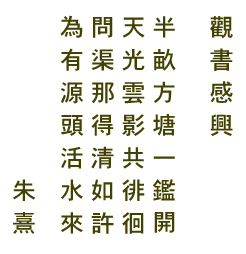 Vertical, from right to left, top down.
Vertical, from right to left, top down.
How to pronounce the words? In pin yin, the numbers mean the tone inflections:
2 is up
3 is down up
4 is down
TITLE: guan shu gan3 xing4
AUTHOR: zhu xi3
POEM:
ban4 mu3 fang tang2 yi jian4 kai
tian guang yun2 ying3 gong4 pai2 huai2
wen4 chu2 na3 de2 qing ru2 xu3
wei2 you3 yuan2 tou2 huo2 zhue3 lai2
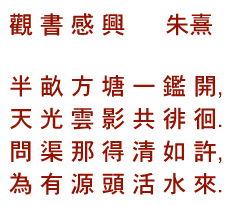
Character by character translation from left to right:
Read book feel enjoyment (title) Zhu Xi (poet)
1. half mu (a land of measure equal to 733.5 sq yards) square pond one mirror open
2. sky light cloud shadow together linger
3. ask it how get limpid like so much
4. because have source flowing water come
When did my grandfather make this calligraphy? On the far left are the characters JIA3 ZI3 which indicate the year according to the 10 heavenly stems and 12 earthy branches: the first year of every 60 years since 3,000 BC. My grandfather must have written it in 1984. Next two characters JI4 CUN refer to the last month of spring. The next three characters are his name.
My father wrote:
As for the deep meaning, the most difficult part is to explain a smack of Zen in the poem. You have to know, first of all, the ABC of Buddha's education (At the top level, Buddhists interpret fo jiao as Buddha's education or dharma, not a religion, because there is no God in Buddhism, while in any other religion in the world there always is an almighty God).
There are analogies in the poem, such as pond and mirror.
9 August 2007
Related links:
Zhu Xi poems
About Zhu Xi
Heavenly stems and earthly branches - with Chinese characters
Heavenly stems and earthly branches - explanation
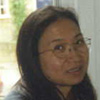
Born of Chinese parents in Brunei, Anne Ku has written about "yuan fen", translated a popular Chinese song sung by the late Teresa Teng, and continues to discover fascinating aspects of her culture while sharing them with her readers.
| Tell your friends about this Bon Journal entry: |
